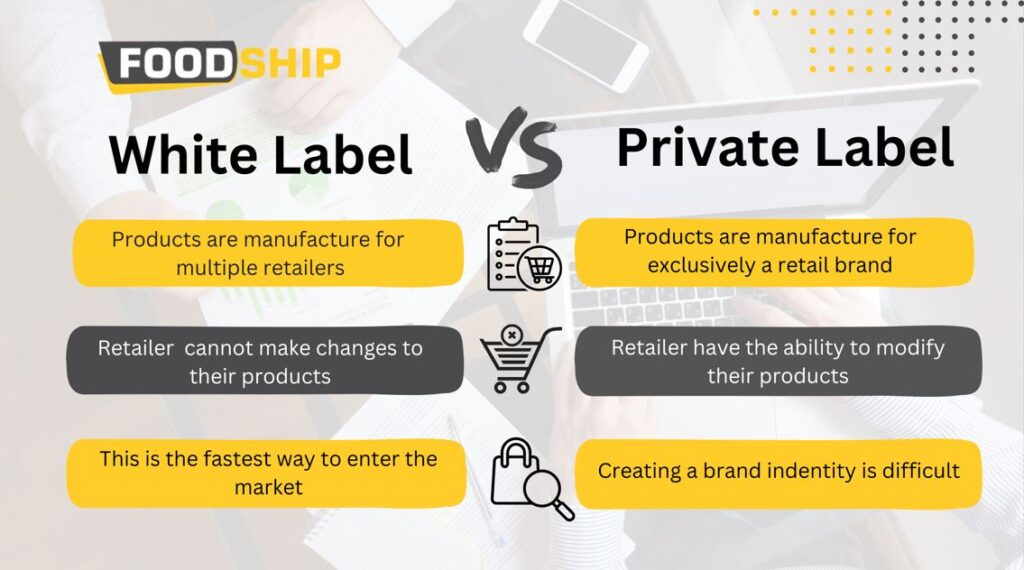I. Introduction
Have you ever dreamt of seeing your own brand name on a product? Maybe it’s a line of cosmetics products or a Software solutions catering to your specific industry, for example, restaurant management software. The good news is, you don’t necessarily need to manufacture or develop everything from scratch to make your brand a reality. You can easily achieve your dream by adopting key strategies: private label and white label. Understanding these key branding terms will be crucial for your journey. We will explore following topics in this blog!
- Grey Label
- Drop Shipping
- Co-branding
- Contract Manufacturing
- OEM (Original Equipment Manufacturer)
- Wholesale
In this blog, we’ll understand what is Private Label vs. White Label: What’s the Difference between both of them? How private label and white label is better than drop shipping and co-branding. Help you decide which strategy suits best for your business goals. So, get ready to kick start your entrepreneurial dreams!
II. White Label vs. Private Label
Both White Label and Private Label allows you to leverage existing products and services, but with a key difference between customization and exclusivity.
Definition:
- White Label: Think of white-label as a blank canvas, you can add color with your brand name and logo, creating your own unique product. Imagine offering your own suite of powerful restaurant management tools – all seamlessly branded with your logo and name. Foodship’s white-label software service providers allows you to offer software service like point of sale software, online food ordering system, QR code ordering system and kitchen display system to strengthen your brand identity. White-label service providers like Foodship offer a faster and more cost-effective approach, enabling you to launch a branded product line in as little as 4-5 days.
- Private Label: Here, you collaborate with a contract manufacturer to develop a product entirely from scratch. You control everything – from the ingredients in a food product to the circuitry in a gadget. This approach offers complete brand ownership but requires a higher upfront investment and longer development time.
2. Customization:
- White Label: Generally, white-label solutions offer customization of branding elements like logos, packaging design, and labels. However, the core functionality or ingredients of the product typically remain unchanged. Foodship takes customization in white-label restaurant management software to the next level! They are open to:
– Integrating payment gateways popular in specific geographic locations.
– Implementing new features based on customer and reseller feedback. Foodship listens to its customers and white-label resellers to understand market needs and deliver truly customized solutions compare to any other white-label service provider.
- Private Label: Private-label manufacturers produce custom-made products for private-label resellers. This gives resellers complete control over every aspect of the product’s design, functionality, and features. Examples include Costco’s Kirkland Signature brand or Amazon Basics – these are unique product lines sold only at those stores, with the resellers having complete control over design and product features.
3. Exclusivity:
- White Label: The same generic product might be white-labeled by multiple brands. This means reseller don’t have exclusive rights to the product.
- Private Label: You own the specifications and design of your private label product, giving you exclusivity within the market.
4. Cost and Efficiency:
- White Label: Generally less expensive and faster to market compared to private label. You’re essentially buying a pre-made product and adding your brand identity.
- Private Label: Requires a higher initial investment due to custom development and potentially longer production times. However, it offers higher profit margins due to the unique product offering.
5. Examples:
- White Label: Foodship an Australian based restaurant management software company offers product like like Point-of-Sale software, online ordering system, contactless ordering system and kitchen display systems. Resellers can customize these products with their own branding (logos, colors) – essentially creating their own branded restaurant management system.
- Private Label: Major Australian supermarkets like Coles and Woolworths take advantage of private label products alongside national brands. These private label products, developed specifically for their stores, offer a strong alternative to national brands. This allows these supermarkets to compete effectively with national brands and offer a value proposition to their customers.
III. Beyond White and Private Label
1. Grey Label:
The Middle Ground A grey label refers to a product or service that lies somewhere between white label and private label. Grey label products often involve a higher degree of customization than white label products but do not offer the full control and exclusivity that private label products provide. This approach offers a quicker turnaround than private label but with slightly more control than a pure white label.
2. API Vs White Label:
Understanding the difference between the two Both white label and APIs offer ways to leverage existing tools for your business, but they cater to different needs:
- White Label (Think: Rebranding): Imagine a pre-made software solution, white label solutions let you customize this software with your own branding (logo, colors, packaging) essentially creating your own “brand”.
- API (Think: Building Blocks): An API (Application Programming Interface) acts like a set of building blocks. It allows software application to connect to features and data from another platform.
3. Drop-shipping vs. Private Label:
- Drop-shipping (Middleman Model): You essentially act as a middleman, selling products from a third-party supplier directly to your customers. You don’t hold inventory; the supplier handles storage, packaging, and shipping.
- Private Label (Custom Brand Creation): You collaborate with a manufacturer to create a custom product under your own brand. You control design, ingredients, and branding, offering a more unique product compared to drop-shipping.
4. Co-Branding vs. White Label:
- Co-Branding: In co-branding, both parties benefit from the collaboration. Co-branding occurs when two established brands collaborate to create a new product or service. This strategic partnership allows them to leverage each other’s strengths. Coles, a major Australian supermarket chain, partnered with Mastercard to offer Flybuys points on Mastercard purchases at Coles stores
- White Label: You rebrand an existing product with your own logo and branding, essentially “borrowing” the product from another manufacturer or service provider. There’s no co-creation involved in white labeling.
5. Contract Manufacturing vs. Private Label:
- Contract Manufacturing: You outsource the manufacturing of your own designed product to a third-party manufacturer. You provide the specifications, but the manufacturer might also produce similar products for other companies.
- Private Label: You collaborate with a manufacturer to develop a completely unique product from scratch. You own the specifications and design, making it exclusive to your brand.
6. OEM (Original Equipment Manufacturer) vs. Private Label:
- OEM: Similar to contract manufacturing, you design a product and outsource its production to an OEM. However, the OEM might also sell the same basic product under their own brand or to other companies.
- Private Label: Private label products are created specifically for your brand, giving you complete ownership and control over the design, ingredients, and branding.
7. Wholesale vs. Private Label:
- Wholesale: You buy products in bulk from a manufacturer or distributor at a discounted price and then resell them under their original brand.
- Private Label: You develop your own brand identity on the product, offering a unique customer experience compared to a generic wholesale product.
IV. Private Label vs. Branding:
Building Your Brand Identity Private label isn’t just about creating generic products. It’s a powerful tool for building a strong and differentiated brand! Here’s how private label plays into the branding landscape:
- The National Brand Challenge: Private label products can be fierce competitors to established national brands. Private-label seller can offer high-quality private label products at lower prices, often due to economies of scale and bypassing national brand marketing costs. However, this doesn’t mean national brands are doomed! They can differentiate themselves through:
- Strong brand heritage and reputation.
- Focus on innovation and unique product features.
- Premium ingredients or materials.
- Targeted marketing campaigns building brand loyalty.
- Branded vs. Private Label: It’s All About Brand Building Even with private label products, you’re still building your brand! You can leverage private label to:
- Create a unique brand identity: Design packaging and marketing materials that reflect your brand values and target audience.
- Offer a curated product selection: Choose private label products that complement your overall brand image and positioning.
- Control customer experience: Maintain consistent quality standards and excellent customer service to build brand loyalty around your private label offerings.
V. Choosing Your Path:
Each model offers unique advantages and drawbacks. Consider factors like budget, desired level of control, brand strategy, and target audience when selecting the model best suited for your business. Out of all business models, white label solutions offer a compelling combination of speed, control, and cost-effectiveness compared to alternatives, White-label service provider like Foodship offer:
- Greater Control than Drop Shipping & Wholesale: Drop shipping offers low upfront costs, while wholesale have more upfront investment but you have minimal control over product quality, branding, and margins in Drop Shipping & Wholesale, while white label grants you complete control over branding .
- More Flexibility than Co-Branding & APIs: Co-branding requires partnering with another established brand, which can be time-consuming and limit creative freedom. White label solutions are highly customizable, allowing you to build your brand identity compare to co-branding & APIs.
- Reduced Risk than Contract Manufacturing: Contract manufacturing offers some customization, but you might compete with other resellers selling the same product. White label solutions mitigate these risks by providing a legitimate, fully branded product line.
Foodship: Your White Label Partner for Entrepreneurial Success
Foodship empowers new-age digital entrepreneurs to enter the hospitality world with confidence. Our white-label restaurant management software solutions allow you to:
- Build a strong brand: Customize the platform with your logo, colors, and messaging to create a unique identity that resonates with your target audience.
- Offer a comprehensive solution: Provide restaurants with all the essential tools they need, including POS systems, online ordering, kitchen display systems, and contactless ordering.
- Scale your business: As your business grows, Foodship’s flexible platform allows you to expand your service offerings and cater to a broader clientele.




